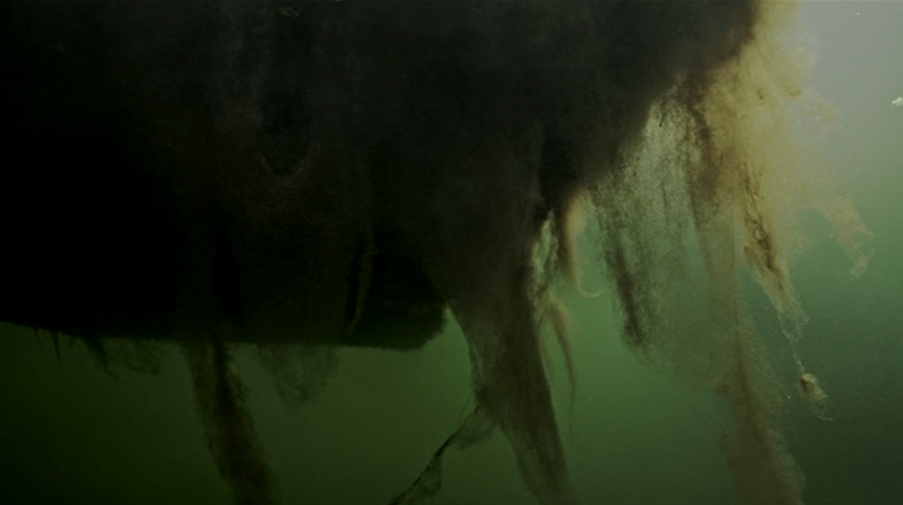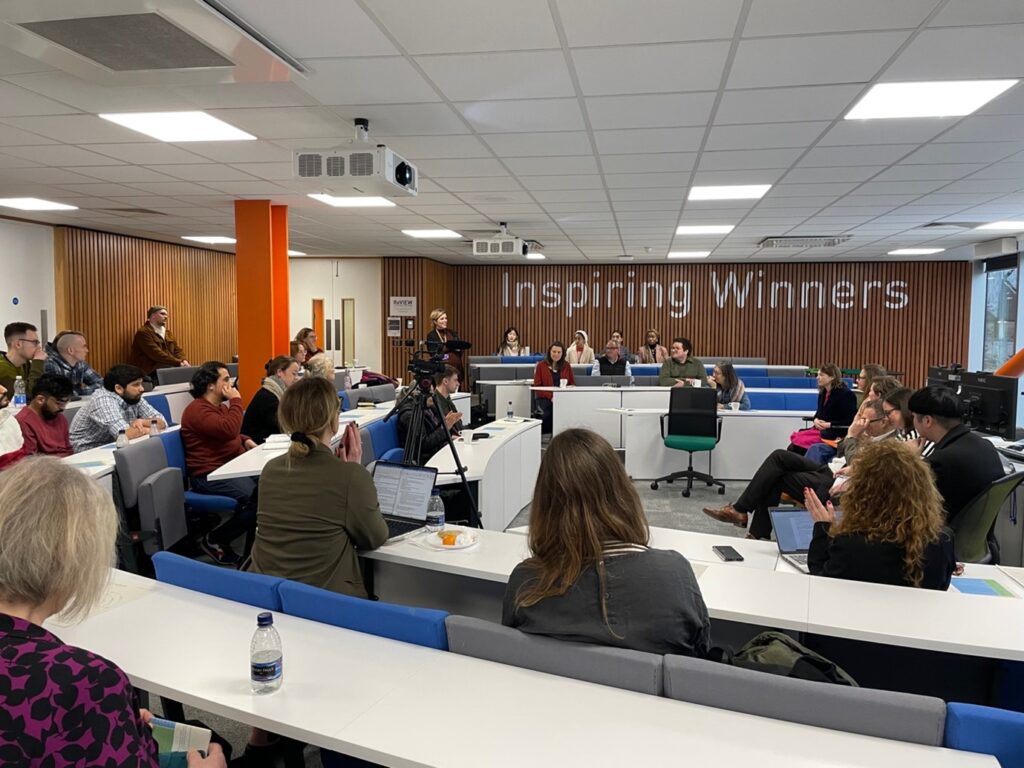Canal Strategy and Future Governance Launch Event Summary
Loughborough University London’s Dr Anna Grosman and Dr Sharon Prendeville, hosted the Canal Strategy and Future Governance launch event earlier this year (Wednesday 7 February 2024), in collaboration with Your Canal Boat CIC’s Erik Ellman and Dr Luke Muscutt.
Situated along the banks of the Hackney Cut canal, the event took place at Loughborough University London’s Here East campus, drawing an audience of representatives from local governance, Greater London Authority, Industry vanguards, canal community luminaries and an array of other key actors to address the capacity of canals to serve as dynamic public realms for community transformation.
The event began with a presentation by Dr Anna Grosman and Dr Sharon Prendeville, showcasing their community-driven research titled “Navigating Canalside Commons: Collaborative Strategies for Urban Waterways.” Delving into the rich tapestry of UK canal systems, they described the intricate interplay between civic growth and natural ecosystems, advocating for the need for balanced approaches in urban planning and regeneration. Central to their discourse was an exploration of the complex network of stakeholders engaged in canal-side spaces. An interactive mapping exercise unfolded, inviting audience members to map out these stakeholders, facilitating a deeper understanding of the presentation’s themes.

Click the link here to view the report.
The crux of the report underscores the transformative potential inherent within canals as vibrant public spheres. The complexities around land ownership and ambiguity around local policy emerged as key challenges, impeding the management and development of canal-side spaces. Proposals stemming from the research emphasised the imperative need for innovative governance frameworks, robust community engagement, and a steadfast commitment to ecological practices, with a proposed community tool envisioned to empower collective land stewardship.
The presentation was complemented with the premiere screening of “Harnessing the Potential of London’s Canals”, a short film made by Tom Walker of www.tomwalkerfilm.com, as part of the wider project, Canal Strategy and Governance. This documentary offered a compelling portrayal of the current state of underutilised spaces along canals within the boroughs of Westminster, Kensington & Chelsea, and Hackney. Through insightful narratives, it traced the endeavours of key actors engaged in policymaking, community building, urban design and educational initiatives aimed at revitalising these areas.
Offering alternative insights, Loughborough University esteemed expert ecohydrologist Professor Paul Wood, followed with a presentation of selected research on “The Hidden Biodiversity of the Canal Linking our Rivers, Towns and Cities.” He screened an excerpt from a mesmerising film by Artist, Sonia Levy, named “Creatures of the Lines” that captured the ethereal visuals and sounds of our canal’s subaquatic realm, exhibiting the mystique of canal ecology.

Professor Wood elaborated upon the scarcity of ecological quality assessments pertaining to canal systems, attributing this gap in part to their artificial genesis as predominantly anthropogenically engineered ecosystems. Diving into the concept of reconciliation ecology within the agricultural and urban milieu, Professor Wood advocated for the cultivation of natural biodiversity within human-made landscapes. By fostering symbiotic relationships between ecological diversity and human utilisation, he posited the potential for establishing a more sustainable socio-ecological paradigm that obviates the need for a trade-off between biodiversity conservation and human activities.
After a short tea break, the first of two round table conversations commenced. Participants discussed the challenges in shared governance of canals and strategies for effective stakeholder communication and collaboration. Panellists included Sasha Galitzine from Gerry’s Pompeii, Canal and River Trust’s Sîan Palmer-Ferry, Asia Grzybowska from Smallwood Architects, Calvin Po from Dark Matter Labs, Loughborough University’s Professor of Communication John Downey and lastly Rachel Chapman of Westminster City Council.

The second round table discussion, chaired by Dr Pandora Syperek, touched on various subjects including the Integration of ecological sustainability in canal-side development, balancing commercial, recreational, and residential uses of canals, and inclusive design principles for Canalside spaces. Panellists included Professor Wood, Francis Castro from Greater London Authority’s London Nature Recovery Programme, Hannah Reid from Thames 21, Matt Hopkins from Group 19 Architects, Katherine Spence from Westminster City Council’s Place Shaping team and project leader of Meanwhile Gardens, Chandrika Dalpat.
Highlights of the panel discussions included Sîan Palmer Ferry’s delineation of the Canal and River Trust’s commitment to supporting canal communities. She outlined the organisation’s long-term strategy, emphasising a concerted effort towards collaborative partnerships considering the substantial £300 million funding reduction recently imposed by the Department for Environment, Food, and Rural Affairs.
Calvin Po from Dark Matter Labs also brought forth compelling insights regarding the intricate and interconnected social dynamics within canal spaces, which are often overlooked by conventional property-centric governance structures. He emphasised the importance of integrating the concept of relationality into canal management practices, suggesting that design approaches should strive to foster alternative systems that promote a culture of stewardship and care, rather than perpetuating extractive and possessive attitudes towards the value associated with canal environments.
The event underscored a prevailing sentiment among attendees—a shared conviction regarding the profound symbolism inherent in canal spaces. These waterways embody a collective resilience, their very essence reflecting the adaptability of societies amidst the intricate web of urban challenges. In preserving the sanctity of public spaces, canals emerge as conduits of urban vitality and social cohesion, nurturing a sense of interconnectedness that transcends the noise of urban life.
An overarching insight gleaned from the event, emphasised by Francis Castro of the Greater London Authority, pertains to the crucial role these gatherings play in convening diverse stakeholders. They serve as vital platforms for building dialogue, aligning interests, and fostering collaborative efforts to address the multifaceted challenges confronting canal spaces and their associated communities.
Embracing Castro’s perspective, attendees concluded the event by discussing the feasibility of subsequent meetings aimed at sustaining momentum, nurturing ongoing dialogue, and amplifying avenues for engagement with local governance. A collaborative effort positioned to initiate lasting and transformative impact.
Special thanks to all attendees for their invaluable input, Loughborough University London for hosting the event and both Dr Anna Grosman and Dr Sharon Prendeville for organising such a successful occasion.
Written by Finn Livingstone, MSc Service Design Innovation student at the Institute for Creative Futures, Loughborough University London.
Loughborough University London
Blogging everything that’s happening at Loughborough University London